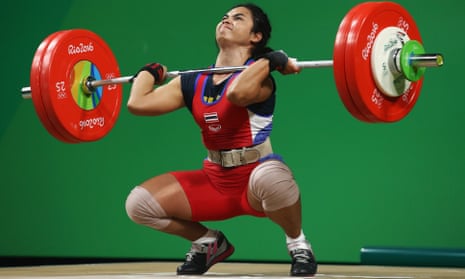The International Olympic Committee has expressed its concerns over “very serious and worrying” new allegations of doping and corruption in international weightlifting – which include claims that girl competitors as young as 13 have been encouraged to take banned drugs.
The IOC’s response follows a series of revelations on German TV, including that nearly half of the 450 world and Olympic weightlifting medallists between 2008 and 2018 did not undergo a single out-of-competition test in the year they stood on the podium.
The ARD programme, Secret Doping – the Lord of the Lifters, also secretly recorded the Thailand weightlifter Siripuch Gulnoi, who confessed to taking drugs before winning an Olympic bronze medal at London 2012.
Gulnoi said the drugs had given her a “jaw like a man and a moustache” but that “those responsible couldn’t care less about health”. She added that some girls in Thailand started doping when they were as young as 13 to prepare for national competitions.
The IOC told the Guardian it had set up an disciplinary investigation “to immediately follow up on the doping confession of Gulnoi and her entourage”.
The programme, made by the same investigators who unearthed the Russian doping scandal in 2014, also alleged that some weightlifters secretly paid testers in exchange for “clean” tests.
Investigators secretly recorded a conversation with Dorin Balmus, a doctor with the Moldova weightlifting team, who said “doppelgangers” gave urine samples in place of athletes in exchange for a payment to testers.
Weightlifting has had doping issues for decades but the issue has become so widespread that the IOC has previously threatened to withdraw its Olympic status. It refused to be drawn on whether the latest allegations would affect weightlifting’s place in Tokyo but in a statement it said: “The accusations are very serious and worrying. The IOC will contact Wada in order to keep anyone involved in the alleged infringements of the World Anti-Doping Code away from the Olympic Games.”
ARD also cited documents allegedly showing that at least £4.2m in funding from the IOC to the International Weightlifting Federation was transferred into two Swiss accounts of which only the IWF president, Tamas Ajan, had oversight.
However, the IWF insisted its executive board had “discussed and dealt with” accusations that Ajan had mishandled Olympic Games TV revenue shares between 2009 and 2011 and had subsequently submitted a “document package” to the IOC Ethics Commission for study.
“It was finally established that no money was missing,” it said in a statement, “and all the Olympic revenues were accounted and duly documented in the IWF official bank accounts (none of them secret).”
The IWF added that, while it took the ARD allegations seriously, the programme contained other mistakes. “The IWF is particularly concerned by the revelations concerning what may have been the systematic doping of junior athletes,” it said.
“Amid a number of apparent falsehoods, unsubstantiated allegations and disproven rumours dating back to as far as 2008, there does seem to be some fresh information which may be of use to the IWF’s efforts to promote clean weightlifting and protect clean sport.”
